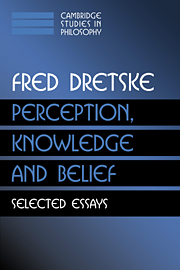Book contents
4 - The Epistemology of Belief
Published online by Cambridge University Press: 19 December 2009
Summary
Believing is easy, knowing is hard. Believing is easy because it is just a way of saying something in the internal language of thought. No trick at all once you have the language. Talk is cheap. The real trick is getting things right or, even harder, securing some guarantee that one has got things right. This is knowledge and this is hard.
Such is the conventional contrast between knowledge and belief. Underlying this contrast is the idea that knowledge, unlike belief, requires special endowments. It takes something more to know because knowledge requires, besides mere belief, some reliable coordination of internal belief with external reality, and this coordination, being an extremely delicate matter, requires the exercise of special skills. If, though, one takes no thought for whether they are true or false, reliable or unreliable, then believing itself is mere child's play – a form of mental doodling. Witness the fact that the ignorant believe as effortlessly as the learned – indeed it seems, with far less effort. According to the conventional wisdom, then, the problem, at least for epistemology (but perhaps not for the philosophy of mind), is not one of understanding how we manage to have beliefs, but one of understanding the sources and extent of their reliability.
This picture, I submit, dominates philosophical thinking about knowledge and belief. It is what keeps epistemology a durable, if not exactly flourishing, industry.
- Type
- Chapter
- Information
- Perception, Knowledge and BeliefSelected Essays, pp. 64 - 79Publisher: Cambridge University PressPrint publication year: 2000
- 1
- Cited by

